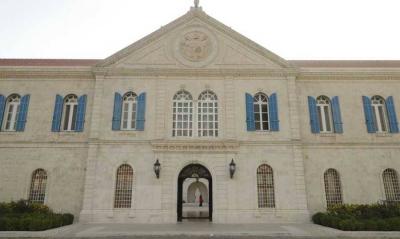Numerous questions accompany the recent actions and positions of Maronite Patriarch Cardinal Mar Bechara Boutros al-Rahi, especially after news emerged about a document being prepared in Bkerke, with participation from representatives of political parties, Christian groups, and independents. The lack of disclosure about the contents of the document and the silence maintained by those involved in its preparation has heightened curiosity regarding what proposals or directions Bkerke intends to adopt and lead the Christian community toward implementing.
The questions arise as calls grow louder for a reevaluation of the political system in the country. Recently, the voice of "Free Patriotic Movement" leader, MP Gebran Bassil, emerged, calling on the Patriarch for a dialogue among Christian leaders, in contrast to Speaker Nabih Berri's ongoing invitation for dialogue as a means to reach consensus on the next president of the republic, as stated in "An-Nahar."
The patriarchal seat does not appear close to or in agreement with any of these dialogue proposals in their presented form or accompanying conditions. According to visitors to the seat, there is a conviction that its head is thinking beyond the current discussions. He believes that the concerns expressed by the Christian street, even if articulated differently, have now become concerns for the Sunni and Druze communities as well. This situation necessitates thinking beyond sectarian approaches toward a national perspective that restores the significance of national partnership in political life.
From this standpoint, the call for Christian unity as suggested by Bassil is deemed unacceptable. The Patriarch seems more inclined toward the paper presented by the "Lebanese Forces," which rejects classifying the presidential crisis as a Christian-Christian crisis, asserting that the first step towards a rescue lies in electing a president. This electoral process forms the primary focus and practical translation of the essence of the document.
On this basis, church sources state that the nature of Christians and their historical leadership role does not allow them to approach the crisis from a sectarian perspective, and thus, they will not fall into this fatal equation that serves those with the project to amend the constitution. This reflects Bkerke's perspective on the mechanism to rescue the country, acknowledging that the Sunnis and Druze will undoubtedly align with the national equation.
The Patriarch is striving to fortify his seat and community with a framework grounded in the constitution and international resolutions, recognizing that political performance may complicate matters. This awareness underlines that guarantees for the success of such a document are very weak. However, he understands that a document with a national dimension, fundamentally focused on restoring sectarian balance and partnership among national components while respecting the constitution—and that is endorsed by other sects—could constrain the group that continues to stymie the situation with impractical proposals that do not yield a president.
This dynamic helps explain the clear yet indirect message the Patriarch directed in his recent positions to the Speaker of the House and, behind him, to "Hezbollah," wherein he dismissed calls for dialogical initiatives, should a document emerge from all Christian powers. Even the candidate Sleiman Frangieh, whose representatives are absent from Bkerke meetings, will not be able to stray from the stance of the patriarchate, according to "An-Nahar."
As for Bassil, the patriarch's message to him was more direct, rejecting the call for dialogue without guarantees for the participation and presence of all parties, especially as such a call carries an anticipatory attempt for the "movement" to invest positively or negatively in an initiative, crediting the success to itself on the grounds that it is the initiator of the dialogue while placing the responsibility for failure on others if it does not materialize. Given that current conditions do not accommodate such populist posturing, al-Rahi chose to remain aloof from such situations, particularly if any Christian dialogue table leads to the eruption of Christian disagreements without yielding viable solutions, which remain elusive to this day.
In any case, consultations continue, supported by Western and Arab backing, and it is likely that the coming weeks will see the crystallization of the document in preparation for its announcement.




